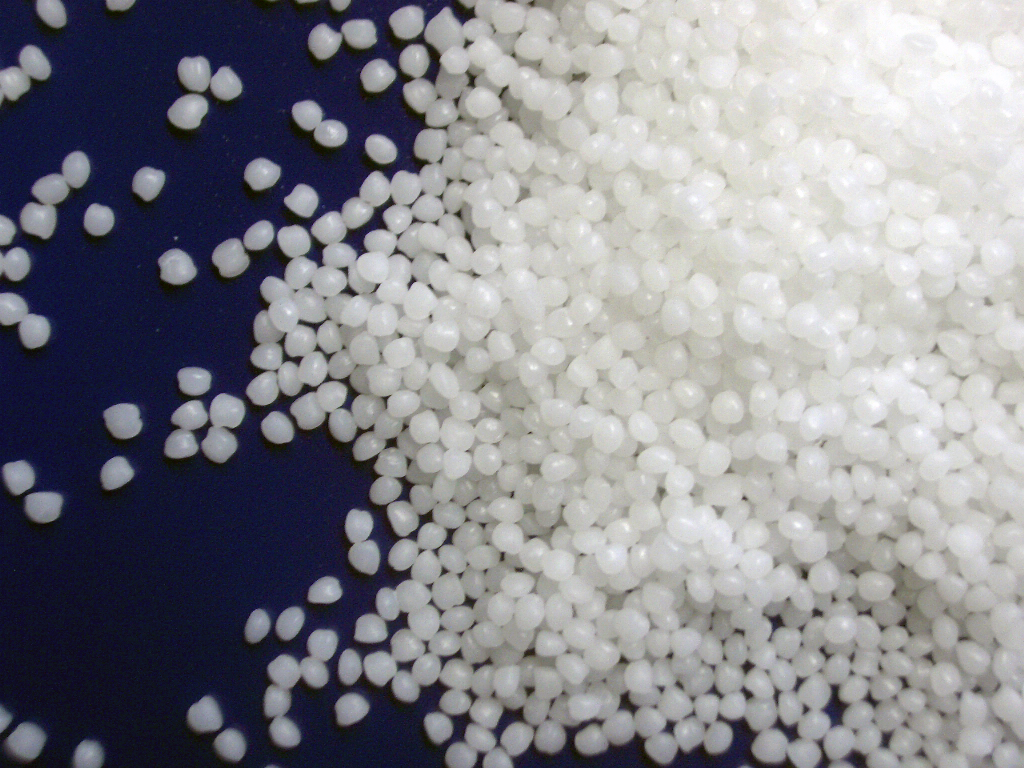The properties of moulded synthetic thermoplastic parts can be significantly improved when they are irradiated with electrons after they are shaped. In this way, cheaper technical plastics such as polyamide (PA) can achieve properties, which come near to those of expensive, high-performance plastics.
The energy of accelerated electrons activates plastic molecules to combine with each other in this method. Single macromolecules, which normally can pass each other, are linked in a three-dimensional network (cross-linking). The structure thus created improves the thermal, mechanical and chemical properties of the plastic, for example stability, when used continuously in high surrounding temperatures, or resistance to abrasion.
For radiation cross-linking, a cross-linking additive is first added to the polymers. The cross-linking of the polymer, which already contains the cross-linking additive, then undergoes shaping, which takes place during the injection moulding process for example. For this, the injection moulder packs the parts up after shaping and sends them to an irradiation company, which irradiates the parts in their packaging. This incurs additional transport times and costs.
A more efficient variation would be to partly cross-link the plastic granulates before they are processed in such a way so that they can be processed afterwards as usual per injection moulding into shaped parts on the one hand, and on the other hand already displaying the typical properties of cross-linked thermoplastics. This variation has already been able to be successfully tried out for the mass plastic polypropylene (PP).
Following these results, the research project »PA-X-Granulates« is to examine whether the route of partial cross-linking granulates, before they are moulded, can also be transferred to the impact-toughened (resistant to the impact of blows and shocks) technical plastic polyamides (PA). Only the impact modifier, which is finely dispersed in the polyamide, is to be cross-linked in the PA-X-Granulate project, whilst the polyamide is not cross-linked. (subsequently this is referred to as »selective cross-linking«).
In the joint project »PA-X-Granulates«, experts at the Fraunhofer Institute for Microstructure of Materials and Systems in Halle (Saale) and the Fraunhofer Pilot Plant Center for Polymer Synthesis and Processing PAZ in Schkopau - in close collaboration with the associated project partners Herotron-E-Beam-Service GmbH in Bitterfeld-Wolfen, Expinos GmbH in Merseburg and qtec Kunststofftechnik GmbH in Gernrode - want to gain a basic understanding of the cross-linking behaviour of commercially available impact modifiers as well as their selective cross-linking impact in modified polyamides.
After the selection of suitable types of polyamides, impact modifiers and cross-linking additives, a systematic investigation of the compounding of the materials is to be carried out (the preparation of plastics through mixing-in fillers or additives) with regards to the impact of irradiation conditions for impact modified polyamide granulates at Herotron as well with regards to their processing behaviour in the injection moulding and the injection moulding compounding processes DCIM. The new DCIM injection moulding compounding technology, developed by Exipnos, combines the hitherto separately running processing steps of compounding and injection moulding into a one-step process operation. The project is to examine what impact the one-step DCIM process has in comparison to the two-step compounding process in the first and in the second separate step injection moulding stage. The supplier to the automobile industry, qtec, makes injection-moulded components as demonstrators with a serial tool using the new material.
The material characterisation, which includes determining thermo-physical and mechanical properties as well as parameter identification of workability for injection moulding, is carried out at Fraunhofer IMWS. A database for the new material is to be built up for a sound understanding of the connection between manufacture, microstructural property relationships and mechanical failure behaviour. This provides potential end users with the building blocks, which support them in their selection of starting materials and process parameters during manufacture.
The research, which runs until 30th September 2019, opens up the possibility of manufacturing tailored products with properties that cannot be achieved with commercially impact-modified polyamides.


